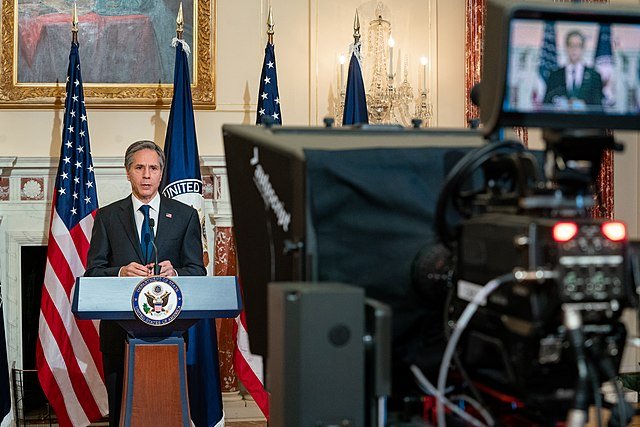Why is Australia so Scared?
Dr Alison Broinowski delivered this presentation at the SHAPE Webinar ‘Asia Pacific NATO: Fanning the Flames of War’ on July 5, 2023.
The world has just spent two decades paralysed by fear. Ever since 11 September 2001, the ‘war on terror’ has changed the lives of most people for the worse. Millions have been killed, either by terrorists or by militarists fighting them. Fearing violence, many people have fled their homelands as refugees. Others have absorbed repeated warnings about Islamist terrorism, and fearfully accepted that the response to it has to be militarism.
In Australia, fear of terrorism made many of us hostile to Muslims and suspicious of our neighbours. But Australians’ enthusiasm for our region had already begun withering in 1996, when John Howard said we didn’t have to change who we are to be accepted in Asia, and disparaged multiculturalism. The recommendations in Ken Henry’s Australia in the Asian Century about making us all ‘Asia-literate’ were buried by the Coalition government in 2013. In this century, we have accepted 90 pieces of anti-terror legislation this century that restrict our civil liberties and allow the authorities to surveil what we read, write, ask, and say.
As fear gradually faded, leaders found new sorts of terrorism – like threats from cyber, pyro, drone, biological, nuclear, space, and AI technologies – keeping people scared and compliant. That meant money continued to flood the military/industrial/surveillance industry, and enabled endless war. Leaders found new national enemies too. When many Australians were becoming less afraid of terrorism and Islamic State, suddenly we were warned about ‘agents of foreign influence’ in our midst. In mid-2018 Prime Minister Morrison gave a positive speech about China one week and a hostile one the next. About half of Australians have now been talked into hating Russia and fearing China, neither of which threatens them.
As with the war on terror, the new anti-China agenda was generated by Americans, who saw Beijing’s rising influence as a threat to the global hegemony of the US. It was delivered by allied governments and the compliant media. And as always, the response to it had to be more sanctions, more fighting, more militarism. But have we been made to fear the wrong wolf? If there’s a wolf at our door, is it terrorism or militarism, or neither? Is it China? Is it America? Or is it our own government?
The United States wants to contain China, so we have joined them in the South China Sea, in the Quad, and in AUKUS with the same intention. In 2020 Australian ministers echoed them in quite gratuitously provoking China over the COVID-19 outbreak. We now allow unfettered access for American troops, ships, and aircraft to Australian territory. They are able to launch attacks from here whenever and against whomever they wish, making Australia a target. Yet Ministers keep talking about ‘sovereignty’, as if we have any left.
Because we’re fearful, Australians continue to trust America so implicitly that our governments do whatever any US administration wants. Never mind that our British allies let us down in World War II, and our American ones will always serve their own interests before ours. The US can always retreat from East Asia: Australia cannot. The ADF is ‘inter-changeable’ with the US military, and our mainstream media bang on about the coming war against China with no discussion of who will win it, or the consequences. We go on, as always, offering more inducements to keep the Americans engaged in our region, AUKUS being the latest, the biggest, and the most irrational.
Foreign Minister Penny Wong is fond of saying we have to deal with the world as it is, not as we would wish it to be. But as Jeffrey Sachs has recently observed, 95.9 per cent of the world’s people don’t want the 4.1 per cent who are Americans to run the world. New blocs of nations are forming and expanding across the global east and south, to do things differently. They are building impressive infrastructure and trade networks with Chinese support. They are moving away from the US dollar as the reserve currency, and getting around US sanctions by conducting business between themselves in roubles or renminbi or whatever. They are changing the world by lawful and peaceful means, not by waging war.
As American hegemony withers, non-alignment is dawning again, after several decades in eclipse. The idea that nations should co-operate without threat or use of force – a fundamental premise of the UN Charter – is guiding many countries, led by China, some of them opting for armed or unarmed neutrality. Yet the US keeps talking up its own ‘international rules-based order’, loyally echoed by Australia, while China and its Eurasian and Southern friends continue to advocate the non-aggressive international law-based order.
Australia is resisting the global trend, clinging fearfully to past assurances, and failing to change with the times. The world has moved on, as Penny Wong often also says: but she and her fellow leaders are not taking Australia with it on climate action, nuclear weapons, or non-alignment. They are out of touch with many Australians. In Melbourne, the Council for the Human Future last year listed ten existential threats to Australia and the world (‘Surviving and Thriving in the 21st Century’, www.humansforsurvival.org.) It called for a radical change in the way we think, to shift humanity from competition to collaboration. It stated: ‘There are other ways to solve these threats than through political, military or economic conquest’.
Before it’s too late, can Australia stop being too scared to do this?

